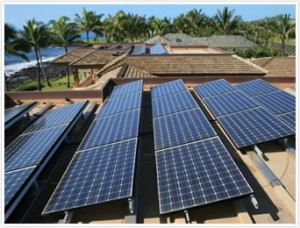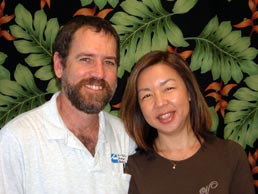Mauian Renewable Energy Firms Receive US Funding
By Sonia Isotov
Earlier this month, Agriculture Secretary Tom Vilsack announced renewable energy grants and loans for more than 500 agricultural producers and rural small businesses across the country, including two companies from Maui.
Under the United States Department of Agriculture (USDA) Rural Energy for America Program (REAP), a 2008 Farm Bill initiative, Pacific Biodiesel Inc. and Maui Pacific Solar, Inc. will receive a combined total of $115,156 in grants and $190,000 in loan guarantees for two very different energy projects.
Pacific Biodiesel will receive a $47,420 grant to develop a B20 biodiesel fueling pump station used by industrial fleet vehicles.
Currently, the company only has B100 pumps available. B100 pumps contain 100% biodiesel and are predominantly used by passenger vehicles, which are considered too slow for industrial trucks.
The B20 pumps, which contain 20% biodiesel, will also allow for the card locks, or card swipe, technology and include an awning for the station. The projects total cost is $189,680, and REAP funds up to 25% of the total cost.
“This award will help us pay for the installation of a brand new, state-of-the-art B20 pump station, which will include the card lock, or card swipe, technology and station awnings that our customers have really wanted.
“They are going to love the convenience and the cleaner, better product, a product that’s made on Maui,” said Kelly Takaya King, Vice President, Pacific Biodiesel Inc. “We anticipate the new B20 pump to be ready by the year’s end, and we’ll announce its location once the award schedule is determined.”
She also added that card swipe technology will be installed in the B100 pump stations and be available to customers 24/7 starting in October.
“There’s a lot that has to happen behind the scenes to make the stations compatible with card swipe technology. It is very expensive, so this is very exciting for us. It’s something our B100 customers have been asking for a long time, so we are very happy to be able to do this for them.”
The USDA grant to Maui Pacific Solar, Inc. is for a 100 Kilowatt (KW) photovoltaic solar system project. The grant is for $67,736 plus $190,000 in loan guarantees, which is about 50% of the $400,000 needed for the project. Mike Carroll, president, Maui Pacific Solar, Inc. says that once the project is completed, he would receive the funds in the form of reimbursements. He plans to file the feed-in-tariff application next week, with the building permit to be filed shortly thereafter.
“The success of the project depends heavily on the Interconnect Reliability Study [IRS] being required by the privately-held corporation of Hawaiian Electric Industries [HEI]. An IRS is required by HEI for renewable energy projects that exceed or even come close to a 15% circuit penetration.”
According to Carroll, this study is very expensive and will take an unknown amount of time, “and may include impediments like expensive infrastructure improvements. The IRS is simply being used as a way for HEI to delay, limit and prevent the development of clean renewable energy in its monopolized areas.”
Carroll continues, “Kauai is way ahead of Maui when it comes to implementing clean energy policies that make sense for the public rate payers. The circuit penetration policy is the main reason that Kauai has been able to implement so many clean energy projects. The Kauai electric utility, KIUC [Kauai Island Utility Cooperative], is a non-profit and is owned by the rate payers, not private shareholders like HEI, and has a circuit penetration policy of 80%, and even has one circuit in Kapaa with a 100% penetration rate for solar energy. Most importantly, KIUC has reported no problems at this high penetration rate.”
Circuit penetration is the amount of renewable energy allowed on each circuit, based on peak load. “So let’s say the peak load of a circuit is 100 KW, then that circuit can have 15 Kilowatts (KW) of clean renewable energy. KIUC will allow 80KW without forcing a study [IRS].” Carroll questions the need for an IRS given the fact that Kauai has already proven that high feed-in thresholds will have no negative circuit impacts and are not an issue for successful renewable feed-in, unlike those being required by HEI on Maui.
With the recent appointment, this week by Governor Neil Abercrombie, of renewable energy advocate Mike Chompley, Carroll says the governor’s move is a “positive force in the right direction” for the success of renewable energy projects like his.
If successful, Carroll says, “Our 100KW photovoltaic solar project could power up to 25 homes at a feed-in rate of $0.238/KW (fixed for 20 years) compared to the rate of $0.40/KW that Maui residents are currently paying for their electricity. This will be an even better value in the years to come. If Kauai can do it, why can’t Maui?”












